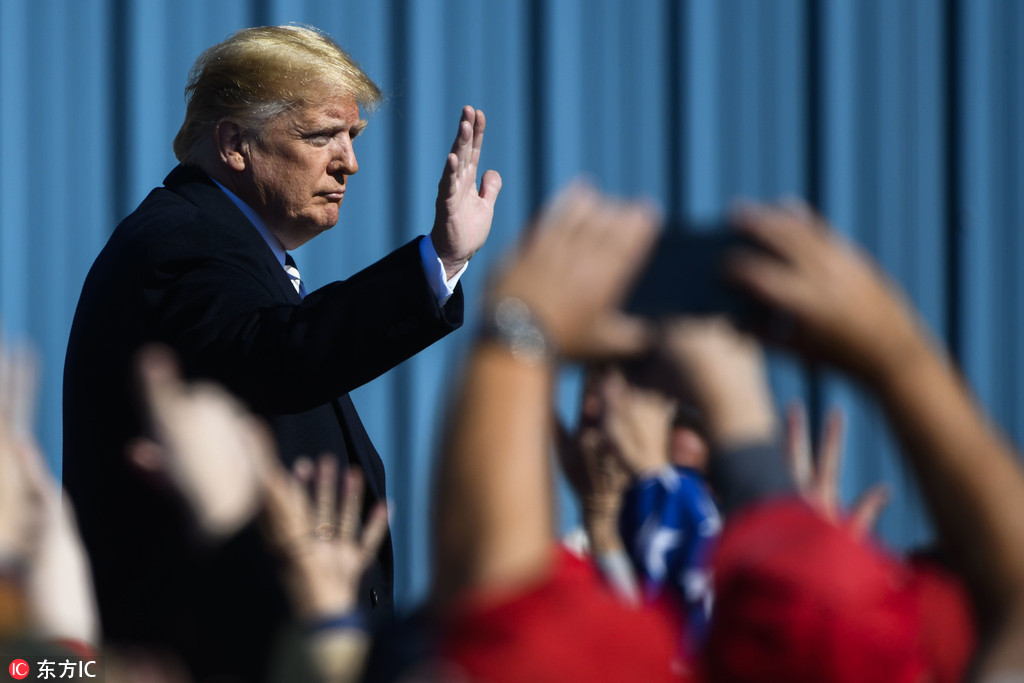
By Li Dapeng
US President Donald Trump announced on October 20 that the US would withdraw from the Intermediate-Range Nuclear Forces Treaty (INF Treaty) due to Russia’s violations. Trump said that the US cannot continue to honor the agreement under the circumstance that both Russia and China are violating it. Unless Russia, China and the US all work together to handle short-, medium-, and intermediate-range missiles and agree not to develop these weapons, the US could only withdraw from the agreement, said Trump.
Trump’s statement is a serious mistake. In fact, China did not join the INF Treaty and therefore the agreement is not binding on China.
Trump’s withdrawal is another setback to the international arms control process after the US unilaterally withdrew from the Treaty on the Limitation of Anti-Ballistic Missile Systems (ABM Treaty). The negative impact of the second withdrawal is even worse.
Short-, medium-, and intermediate-range missiles with a range of 500 to 5,500 kilometer that were included in the INF Treaty are the most common weapons in modern warfare. The range also covers the distance in possible wars in Europe and its surrounding areas between Russia and the North Atlantic Treaty Organization (NATO). The starting point for the signing of the agreement between the US and the Soviet Union was to prevent the two countries from waging conventional wars on the European continent.
Therefore, politically, Russia regards the withdrawal of the US as a hysterical anti-Russian action. Militarily, Russia believes that the purpose of the withdrawal is to pave the way for the deployment of short-, medium-, and intermediate-range missiles in Europe.
The withdrawal of US set a bad example. Without the constraint of the agreement, the US-Russian military confrontation and geopolitical game will have a broader space in terms of warfare means, and the escalation and expansion of military competition between the two countries will become inevitable.
A series of chain reactions will be triggered if the INF Treaty is abolished. The INF Treaty is the first disarmament treaty in the world to completely ban a weapon category. Its signing is of great significance in the history of international arms control. It is one of the most important treaties in international arms control, and one of the cornerstones of the establishment of the international arms control treaty system.The INF Treaty is interdependent with the Treaty on the Non-Proliferation of Nuclear Weapons (NPT).
If the INF Treaty is abolished, it will deal a heavy blow to the international disarmament process, which means the initial collapse of the international arms control treaty system.
Just as the US withdrew from the ABM Treaty, missile defense will become a hot spot for military competition among nations. It can be predicted that countries other than the US and Russia will inevitably compete for missiles and other armaments for their own security reasons. One of the manifestations willbethe proliferation of ballistic missiles, which will have extremely serious consequences and far-reaching effects.
At the time of the signing of the INF Treaty, only the US, the Soviet Union, France and China had short-, medium-, and intermediate-range missiles. Today, nearly 30 countries have such missiles through independent research and development and international market purchases. Under this circumstance, missile proliferation is inevitable. An even greater danger could arise if forces of terrorism, extremism and separatism also come to possess these missiles.
As a result, short-, medium-, and intermediate-range ballistic missiles that can carry nuclear and biochemical warheads will be regarded as the new trump card by some small and medium-sized, weak and poor countries. Because only in this way can they ensure military deterrence and possess means of attack to compete, to some extent, with big and powerful countries as the US and Russia.
For this reason, Russian President Vladimir Putin’s warning on the withdrawal of the US is unprecedented: “If Russia comes under a missile attack, it will immediately use nuclear weapons to fight back. Those who launch such attack will meet a dead end, and have no time to regret their action.”
Former Soviet President Mikhail Gorbachev, who signed the INF Treaty, also expressed concern: “Washington wants to return to the political struggles amidst the Cold War era and we cannot support that. Not only Russia, but all countries that are eager for a nuclear-free world must voice their concerns over the US withdrawal. Does Washington really not understand what this will lead to?”
Disclaimer: The author is Li Dapeng. The article was published on the China Youth Daily and translated from Chinese into English and edited by China Military online. The information, ideas or opinions appearing in this article are those of the author and do not reflect the views of eng.chinamil.com.cn. Chinamil.com.cn does not assume any responsibility or liability for the same. If the article carries photographs or images, we do not vouch for their authenticity.









